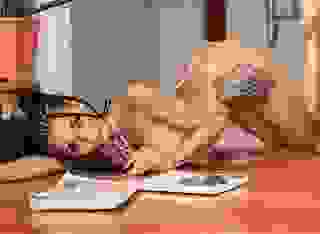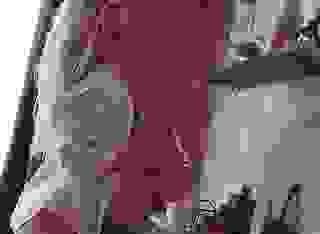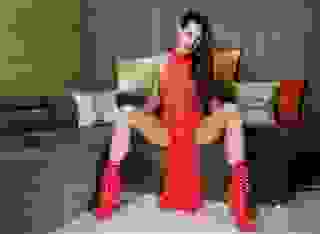Note: You can change font size, font face, and turn on dark mode by clicking the "A" icon tab in the Story Info Box.
You can temporarily switch back to a Classic Literotica® experience during our ongoing public Beta testing. Please consider leaving feedback on issues you experience or suggest improvements.
Click here"The couple that lives there are the William and Wendy Johnsons, neither of whom works for HHS."
"We've got him," I said.
I went back to my laptop and started writing the story, then stopped.
"Cindy, you should write this. Otherwise I'm quoting myself. If you do it, you can quote me no problems."
Cindy didn't argue. This was sure to be the lead story in tomorrow's paper - identifying a person of interest in the shooting of a cabinet member -- we were all too competitive to turn that down.
Henry at one point asked, somewhat timidly, "Shouldn't we call the police?"
"Fuck 'em" I said. "If we do that, the Times has the story at the same time we do. I'll call the FBI agent and set up a time to meet with him later. I'll tell him it's important but give no details."
Cindy was on the phone with the copy desk, answering questions. We'd sent a still photo from the video in a separate email, and they confirmed they had it. It was reasonably sharp and good resolution. WE'd added a still from my Ring doorbell cam. It was no where near as sharp, but when you compared them side-by-side, you could tell they were the same guy. They were running the story on page one with the headline; "Do You Know This Man?" and gave the phone number of a phone bank at the paper. They also put an anonymous form on the website for digital subscribers. Our technology people would do a sort to see if one name kept popping up. When it did, he was toast.
I had put Brockman's cell number into my phone and I called him at about 10:30 p.m.
"Brockman."
"Agent Brockman, this is Stephen Bradley from the Washington Post."
"Hello Stephen. Pretty late to be calling, don't you think?"
"This is something you'd be willing to get out of bed for."
"Okay..." He sounded tentative. "You know that I've been replaced as lead agent on the Cameron case, don't you."
"I didn't know, but I guess I'm not surprised. But if you want to be back in the lead role, I think what I want to share with you might just do that."
"Really?" Now I had his attention.
"Yes. I can meet you in the morning and give this stuff to you then, but just to be fair, you should know that it will be in the Post's morning editions."
"Any way we can get it sooner?"
"Well, I shouldn't really do this, but if you'd like to come to my place now, I can give you what you need. All I ask is that neither you nor anyone in the agency alert any other media outlet until the Post is on the street. That will be about 3 a.m."
"Okay. I can do that. Can you give me a hint?"
"Well, I think I have a photograph of the man who killed Rodney Cameron."
"Jesus. What's your address?"
I gave it to him.
"I'll be there in 15 minutes."
When Brockman got to my apartment, I showed him what we had, and how we'd arrived at that conclusion.
"It doesn't answer the question of how he got a gun inside the building, because the video shows him going through a magnetometer, but I'd bet my life that he's the guy."
"Damn. This is literally the first break we've had in this case. Now it's just police work."
"Now look at this photo from my Ring doorbell cam. What do you think?"
"They're the same guy. We can do some computer analysis, but just visually it's the same guy. No doubt in my mind."
"I told you we're running the photos with a phone number to call and an online anonymous form to fill out if readers recognize him. We'll get a lot of wackjobs calling in their neighbors for imagined slights. But I figure if we get two hits on the same name, that should do it. Trouble is, he's probably not local. But you can get the image to go national easily enough."
Brockman was bundling up the copies I gave him and was getting ready to leave.
"I've got to fly. The director needs to know this and he goes to bed at 11 o'clock sharp. I'll call him from the car."
He was gone as quickly as he arrived.
When I went to find Sydney, she was in my bed. I was exhausted, but she was naked and well, some things are more important than sleep.
"I thought he'd never leave," she said, sleepily.
We spooned together for a bit, with me kneading her breasts and tweaking her nipples. She moved her awesome ass against my hardening cock and when I was hard, reached between her legs and grabbed my cock and slid it into her. We made love quietly, languorously. I was able to reach over her leg and finger her clit while we fucked, and she came hard about 10 minutes into it. Her orgasm stimulated mine and we laid together talking for a long time, my cock slowly softening inside her and eventually slipping out.
"I'm so glad you browbeat my agent into getting me your contact info," I said. "Just think, we could have gone the rest of our lives without sharing times like this."
"I know. And this is so great, it makes me feel slightly piggish that I want more."
"More?"
"I want to be here in bed with you every night. I want to have dinners together, take long walks, do middle-of-the-week things and have a full-time relationship. But I'm not ready to retire, not by a long shot, and clearly neither are you. I don't want to be frustrated."
"I have sort of an open job offer from the Times. An editor there calls me every so often to ask if I'm sick of Washington yet. They'd put me on the national desk, and I'd still write the same stories. But I'm not sure I want to leave Washington. I mean the Times wouldn't care where I lived, but there's no point switching to the Times if I still live here. The point is to be closer to you."
"If I could work things out -- maybe only be onsite from Tuesday through Thursdays most weeks and be here Friday through Monday, would you be okay with me moving in?"
"Okay? Sydney, there's nothing that would make me happier. But don't you have to be at the museum?"
"You know, something Cindy said to me when you were in the hospital made me think that I'm more in the driver's seat in the relationship with MOMA than I might have thought. She told me that the two of us were so well-matched on so many levels -- even if we hadn't been in love all those years ago. She told me that one of the things that worked for us was that you're a legend in your field -- honestly, five Pulitzer prizes. No one else has ever had more than three. And she said that I'm a legend in my field as well. No one anywhere has ever raised more money for cultural causes.
"I'd never looked at it that way, but I think she's right. Maybe not the 'legend' part, but I am absolutely at the top of my game. There's no way they'd say no to anything I want if they think I'm willing to quit if I don't get it."
"For what it's worth, I think you're legendary," I said, pulling her tighter.
"Thank you, sweetie. I think I'll talk to my boss tomorrow. Tell him what I'm going to do."
I chuckled. "Tell him? Not ask?"
"Fuck 'em. Not going to give them a choice."
His name -- the man who swung a baseball bat at me and later kicked me in the head -- was Donald Gray. He was a former member of a criminal motorcycle gang, where he was known as Snake. He was a tough SOB, utterly unscrupulous and capable of great violence. I had been lucky.
The post had more than a thousand calls and online contacts by 11 a.m. the next day. People all over the country were seeing the pictures. We had 10 matches, total, and the Post called Brockman to give him the details. When we called, we learned that Brockman and his team had been busy overnight. Facial recognition software had identified Gray from multiple arrests in strong-arm style crimes over the years and they already had formed an entry team in LA which was due to take him down at 8 am. He might not have seen the photos yet and the feds might be able to catch him unawares. The weakness in our plan, Brockman had told me last night, was that he might bolt the minute he saw the photos. Catching him on the run was bound to be tougher.
We waited in Washington -- I went into my office at the Post -- for word of the raid. The FBI went in hard -- heavily armed agents, breaching the door, flash bang grenades to disorient him. We eventually got word that he resisted arrest and started shooting the moment the team entered his apartment. The entry team returned fire and he was now at an LA trauma center in critical condition.
Brockman called to give me the news -- not as a reporter, of course, they wouldn't have told us squat, even though we essentially solved the crime for them. He called me as a victim. Said I had a right to know.
"I have to tell you Stephen -- totally off the record please -- this entry was a total cock-up. We told the LA Agent-in-Charge that we needed him alive. That was a top priority. They could have waited and taken him on the street later in the day. But they had to go all Rambo on us."
If he lived, they were optimistic they could get him to deal -- give up Beckwith or whoever hired him -- in return for a chance at getting out of prison before he died. He apparently made deals for more lenient sentences in the past. But if he died, we were back to square one.
Ch. 15
Upstate New York, May 1988
I met Sydney's parents -- and she met my mother -- at graduation, the second Saturday of May in 1988. Her mother was lovely, embraced me, kissed me on the cheek and told me how she'd heard so much about me. I tried to shake hands with her father, but he was suddenly busy with his program book and wouldn't meet my eyes.
I fairness, my family wasn't much better. My mom was not quite cold to Sydney. By then, I think she knew how much Sydney meant to me, so she tried to be pleasant, but her racism seemed -- at least to me -- in the way.
Sydney and I graduated at the top of our class, and won multiple awards. We were seated far from one another during the ceremony -- alphabetically we were at the extremes. I wouldn't have even given that a thought, except the event I'd dreaded almost since my first week in college was upon us, and our time together was drawing to a close.
We'd gone out to dinner the week before during a break in our final exams. We broke from our usual pizza habit and went to a fancy steakhouse that nearly broke me. I had a job for the summer months, and I'd be living at home, so I went for it. I was working in Saratoga during July and August, during the Saratoga Raceway's season as a Pinkerton security guard. It was laughable, really, but the pay was great and I needed every nickel to pay for the rest of my college.
At dinner, in an old-fashioned place, we sat opposite each other in and old wooden booth with cracked green leather cushions and held hands for as long as we could before the food came. Sydney was uncharacteristically emotional, almost weepy, and it was hard to see.
"Do you think we can find a way to have some weekends together?" she asked me at one point. I would be in school in Chicago and she in Rhode Island. It was hard to see how we could make that work in a weekend.
"I could try to budget some money to fly to Providence. It's a short flight, but I'm going to be pretty tight for cash."
She was shaking her head. "I can't ask you to do that, Stephen.
I was going to Northwestern University and the Medill School of Journalism. Syd was going to the Rhode Island School of Design.
"It's only two years," I said. "We just need to keep in touch. Then get together over the summer."
She brightened at that suggestion, and we finished our dinner and went out for a walk, arms around each other's waists. Anyone seeing us would have assumed that we were lovers.
We ended up at my apartment. My roommates were all gone by now -- walking for graduation terribly out of fashion -- but Syd and I stayed. Partly because of our place in class -- we were expected to walk -- and partly to delay that painful moment we were anticipating.
We put on a movie, but pretty much ignored it as we spent the evening deep in conversation about our aspirations.
"Where do you want to be in ten years, Stephen?"
"At a big daily paper," I said. "The Times, or the Post, or the Chicago Tribune. Some place like that. How about you?"
"I don't know... I envy your certainty about your future. My path is less clear. I'm going to art school, so most people assume I want to be an artist, but I'm not sure. I know that I want to understand art and culture from an insiders' perspective."
"Do you want to get married?"
"Yes and no," she said. "Yes if it means kids and family life, no if it means being under the thumb of some man."
"I find it hard to believe that Sydney Thomas would ever consent to be under the thumb of any man."
"I don't know. In my family, women are expected to cook and clean and have babies. That's not for me. I'm going to have a career."
"What if you fall in love and the man is traditional and wants you home?"
"I couldn't love that man. And if I did, I'd have to make a choice."
We sat in silence for a while, then Syd laid down, across my lap and just stared at my face.
"You know this is weird, right?"
"Mmm. Then just hold me," she pleaded.
And that was how we spent the rest of the night. We woke around 4 a.m. and disentangled ourselves to some extent, but still touching, went back to sleep until 8. Her parents were arriving that day, for the graduation on Saturday. She had missed them, clearly, and was happy to see them. But she was a little pissed at them at the same time.
"I asked my dad if I could invite you to the dinner."
"What did he say?"
"He just huffed. 'You mean that white boy? Why would we want him? This is just for us.'"
"That's ok. It would have been awkward as hell anyway," I said. "But I don't get what your dad has against me."
"What does your mom have against me?"
"That's easy. She's a racist."
"Yeah. Well, not all racists are white."
When morning came, we hugged and promised to meet each other alone without our parents after the graduation ceremonies.
Syd seemed close to tears. I know I was.
After graduation, I know Syd was giving her father hell for not shaking hands with me, which was my cue to exit. I was saying goodbye to my mom, and she was teary.
"Stephen, your father would be so proud of you."
"I know mom. I wish he could have been here. I miss him, you know." Silently, I also thought that if my dad was still alive, he might have been able to talk some sense into mom about Sydney. Without him, I never felt like I had a chance.
I finally said goodbye to my mom, and went to the Pioneer office, where I'd stashed my gift to Sydney. I was lost in thought there, trying to sort out how we could be doing this, but coming to the same conclusions every time. Our parents could barely tolerate that we were friends, much less lovers. There was no way to be together.
"Earth to Stephen," Syd teased. How long she'd been standing there, I didn't know.
"Sorry. I was a million miles away."
"I could tell."
Just then, a bevy of other kids found their way into the Pioneer's suite. Including the girl who would be next year's editor. This was really her office now, not mine, so Sydney and I retreated to our favorite place to be alone together, the nearby stairwell.
I gave her my box of stationery and she gave me a beautiful sterling silver ballpoint pen.
"This must have cost you a fortune," I said. "It's so nice."
"I want you to put that in your pocket and use it. Win a Pulitzer Prize Stephen Bradley. I want to read about it in the newspaper and show my kids. 'I knew that man back when...'"
'Syd... I ... I want to tell you ..." I choked up, my eyes filling with tears, succumbing to my emotions at last. Syd hugged me, held me tight and I tried again.
"I need to say this..."
"Shh, Steven, I know."
"No, Syd, I..."
Sydney leaned back and put a finger to my lips, then brushed the tears away from my face.
"Silly boy. You think I don't know?" Tears were streaming down Sydney's face now too. "I love you too Stephen. I always have. Always will."
We both lost it then and spent the next few minutes in tears, holding each other like it was the last time we'd see each other, because we feared it would be. Then we kissed each other for the first time, long and deep, romantically and feverishly. We broke the kiss, and Sydney muffled some with her face in my neck, cried some more.
"I keep trying to rethink what we're doing, trying to come to a different conclusion, but I can't think of anyway we can be together without so much sacrifice. I won't ask you to give up Medill, and I can't bear to give up RISD. But I'm not sure I can bear to be apart from you, either."
"I've been doing the same thing Syd. It keeps going over and over in my mind until I want to scream," I said. We hugged some more, but it was getting late.
"Stephen...This isn't going to get any easier. So just go, please. Know that I love you and will keep you with me always."
I wrenched myself away, and went down the steps and out the door to Lemonade. Got in and drove away.
Chapter 16
Washington, DC
I went home that night not knowing whether Donald Gray was going to live or die. I'd had the team working feverishly all day, trying to find acquaintances of his, trying to begin to make sense of who the other assailant had been. We made no discernable progress.
We had a great follow-up story, of course. The raid on Gray's home and his arrest made great copy. But it would be hard to say it advanced people's understanding of what had happened. We had a reporter in Los Angeles who went door to door talking to neighbors, every one of whom were happy to see the last of him. We pulled apart the public record on him and searched, fruitlessly, for some connection between him and Beckwith. Nothing, until Cindy went to the newspaper's library from her compter.
"Look at this," she said, breathlessly. "Is this who I think it is?" She turned her monitor toward me so I could see a clipping from a newspaper from a couple of years back, which showed a picture of Beckwith with another man, who was just behind him and to his left. The second man looked like Donald Gray.
"We need that original photo. We need to blow it up and see if we can do some kind of scientific analysis of his face."
Henry, who had been listening, said he knew someone who might help him.
"I know a guy who plays around with facial recognition software. Has some pretty sophisticated tools. Let me call him."
Henry called his source and Cindy called the photographer who immediately went to work to find the original digital image. Within ten minutes, we had the image emailed to Henry's source, along with the security camera image for comparison. We waited anxiously for him to get back to us.
Cindy came over to me while we were waiting.
"How are you holding up?" she asked, concern in her voice and on her face.
"I'm okay, I guess. Tired, but I always seem to be tired these days."
"You still are recovering, Stephen. I may take a while. Why don't you go home and hang out with Sydney while we're waiting. I'll call you as soon as it's in."
"Sydney went back to New York," I said. I gave Cindy a rueful smile, "Not much point in going home, at least now. She was going in to talk turkey to her boss. She wants to be here in Washington every week from Friday through Monday, onsite three days a week and remote the rest of the time."
"I'm glad for you guys," Cindy said. "I can remember a time when the thought of a girlfriend moving in would have terrified you." She chuckled. "Imagine Stephen Bradley settling down."
"We lost so much time," I said. "I try to think of how my life would have been if we'd been together all these years."
"I know you both feel regret, but you have to look at it this way. No telling if you guys would have accomplished all you've accomplished. She wouldn't have her girls. You might not have five -- count them -- five Pulitzer Prizes. You can't assume a straight line trajectory would have led you to where you are now. Just capitalize on what you have."








